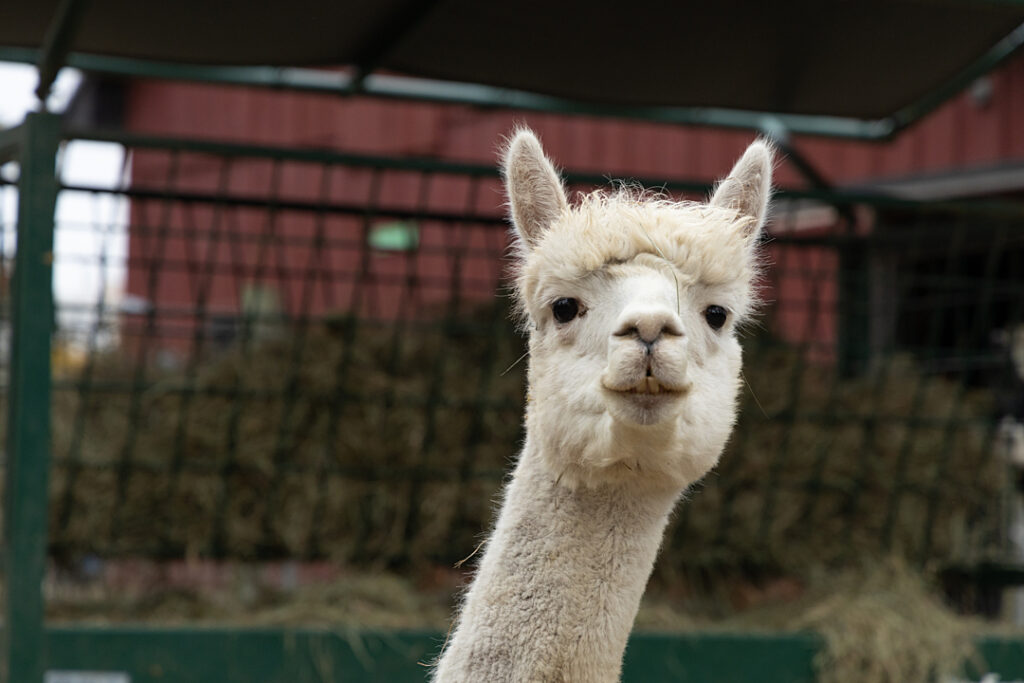

Veterinary Review Initiative
This resource was reviewed for accuracy and clarity by a qualified Doctor of Veterinary Medicine as of September 2025.
Check out more information on our Veterinary Review Initiative here!
A Note For Readers From Outside Of The US
Whenever possible, we strive to create resources that can serve the global sanctuary community, but some topics require a more specific focus. While folks caring for alpacas outside the US can still gain valuable information from this resource, we do want to point out that it is focused on vaccine recommendations in the US. Because disease risk can vary by geographical location, and vaccine availability and regulations differ from country to country, some of the information below may not apply to alpacas outside the US.
Vaccines can play an important role in helping to keep residents healthy, but it’s important to work with your veterinarian to establish the most appropriate vaccine protocols based on the specifics of your resident population and your region. There is no standard, one-size-fits-all vaccination program for alpacas, and there are currently no vaccines labeled for use in camelids. However, your veterinarian can recommend extra-labelExtra-label use means that a drug is used in a way other than what is described on the label or package insert. If a drug is used in a different species than what it has been approved for, this is extra-label use. Other examples include using a drug to treat a different condition than it is approved for or administering it in a different way than the directions describe. Extra-label drug use can only occur within the confines of a valid veterinarian-client-patient relationship. use of vaccines designed for other species (such as equines or sheep) based on your residents’ risk of disease, the consequences of disease, and what is known about the safety and efficacy of extra-label use of different products in camelids. You can read a bit more about working with your veterinarian to establish a vaccination program for your residents here.
Ongoing Communication Is Key!
Once you establish vaccination protocols in consultation with your veterinarian, be aware that they may recommend delaying or avoiding certain vaccines in residents who are ill. Be sure to check in with them for specific guidance.
While an appropriate vaccination program can help minimize the risk of certain diseases, it is just one aspect of disease prevention. Biosecurity, diet, housing, cleaning practices, and veterinary care (amongst other things) also play a crucial role in keeping residents healthy. Below, we’ll offer general information about some of the vaccines that tend to come up most often when caring for alpacas, but you should defer to your veterinarian for specific recommendations for your residents. They may recommend other vaccines that are not listed here based on the diseases that are prevalent in your area.
Clostridium perfringens types C and D and tetanus (Core Vaccine)
There are many clostridial organisms that can live in the soil and even in the gastrointestinal tract of healthy animals. While there are a host of clostridial organisms that can cause disease in camelids, the most common are Clostridium perfringens types C and D and Clostridium tetani. There is a three-way vaccine available, referred to as “CDT,” that protects against all three of these pathogens and the diseases they cause. Because of the prevalence of these clostridial organisms and the fact that they produce toxins that often cause fatal disease, CDT should be considered a core vaccine.
Protection Against Other Clostridial Diseases
Depending on your residents’ risk of exposure to other clostridial diseases, your veterinarian may recommend a seven- or eight-way product instead of the three-way CDT. In addition to offering protection against C. perfringens types C and D and C. tetani, these products offer protection against other clostridial organisms that may pose a significant risk in certain regions.
After determining which product to use, be sure to consult with your veterinarian about how often residents should be vaccinated following their initial vaccination and booster. CDT is typically administered annually. It is especially important to ensure residents are current on this vaccine when they are neutered or after sustaining a wound.
Rabies
Because there have been cases of rabies reported in camelids, and because of the zoonotic nature of the disease, your veterinarian will likely recommend annual vaccination against rabies. Unlike some other vaccine products that can be purchased at farm supply stores and administered by anyone who knows how to administer injections, in many states, only a licensed veterinarian can administer rabies vaccines. Proper record keeping is imperative when residents receive any vaccination, but this is especially important when it comes to rabies. Be sure to record the date the vaccine was administered as well as the vaccine brand and serial number. When possible, ask the administering veterinarian for documentation for your records. Because the vaccine is not approved for use in camelids, vaccinated alpacas may still be considered “unvaccinated” by officials in the case of rabies exposure.
Equine Herpes Virus 1
Equine Herpes Virus 1 (EHV-1) primarily affects equines but can also affect camelids. If your alpaca residents live with equines or have direct contact with equines (such as nose-to-nose contact over a fence), vaccination against EHV-1 may be recommended.
Leptospirosis
Leptospirosis is a contagious disease caused by a group of bacteria called Leptospira. Camelids, as well as most other mammals, including humans, can be affected by leptospirosis. In agricultural settings, vaccination is typically focused on preventing reproductive issues associated with this disease. While this is not a concern in sanctuary spaces where residents are not allowed to breed, your veterinarian may still recommend vaccination, especially in areas where leptospirosis is endemic.
West Nile Virus
If West Nile Virus (WNV) is a concern in your area, your veterinarian may recommend vaccination against this virus. Given that West Nile is a vector-borne disease, vaccination must be timed carefully to offer protection for the vector season. Your veterinarian will be able to provide specific guidance.
Eastern Equine Encephalitis
Eastern Equine Encephalitis (EEE) is a rare but serious vector-borne disease. In the U.S., it is found primarily in eastern and Gulf Coast states, and if you live in these areas, your veterinarian may recommend vaccination to protect your camelid residents. Currently, there is no EEE-only vaccine available, but combination products are available that also offer protection against other diseases (such as EHV-1 or western and Venezuelan equine encephalitis). Your veterinarian can recommend the most appropriate product for your residents. As with vaccination against West Nile Virus, vaccination must be timed around the vector season to offer the best protection.
A Quick Note On Dosing
Caregivers may wonder if smaller individuals require smaller doses of vaccines than larger camelids. The answer is that they do not. While you may need to wait for a very young cria to reach a certain age before they receive certain vaccinations (following your veterinarian’s recommendations), everyone who is eligible for vaccination will receive the same dose as other members of their species, regardless of their weight.
SOURCES:
Vaccination Guidelines For Camelids (Llamas And Alpacas) | Large Animal Medical Associates
Camelid Vaccinations | Llama And Alpaca Care (Non-Compassionate Source)
Camelid Herd Health | Veterinary Clinics Of North America: Food Animal Practice (Non-Compassionate Source)
Non-Compassionate Source?
If a source includes the (Non-Compassionate Source) tag, it means that we do not endorse that particular source’s views about animals, even if some of their insights are valuable from a care perspective. See a more detailed explanation here.








